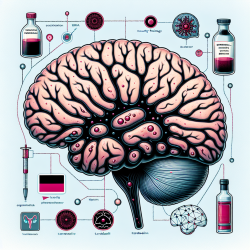Introduction
The impact of alcohol on fetal development is a critical concern, particularly its effects on the developing cerebellum. The cerebellum, essential for motor control, cognitive functions, and emotional regulation, is highly susceptible to alcohol toxicity. This blog aims to translate findings from the research article "Alcohol Toxicity in the Developing Cerebellum" into actionable insights for practitioners, particularly those involved in speech language pathology and related fields.
Understanding Fetal Alcohol Spectrum Disorder (FASD)
Fetal Alcohol Spectrum Disorder (FASD) encompasses a range of effects that occur in individuals exposed to alcohol prenatally. These effects can include structural and functional abnormalities in the brain, particularly in the cerebellum, which can lead to deficits in motor skills, cognition, and social behavior. Recent studies highlight the cerebellum's vulnerability and its role in exacerbating cerebral dysfunctions associated with FASD.
The Cerebellum's Role in Neurodevelopment
The cerebellum is not just a center for motor control; it plays a significant role in cognitive and emotional processing. Damage to the cerebellum during development can disrupt the cerebello-cerebral circuits, which are crucial for integrating sensory and motor information. This disruption can lead to difficulties in attention, executive function, language, and social skills, which are often observed in children with FASD.
Therapeutic Approaches: Targeting Cerebello-Cerebral Malfunctions
Given the cerebellum's critical role, therapies should focus on restoring the function of cerebello-cerebral loops. Two promising areas of intervention include:
- Anti-inflammatory Strategies: Neuroinflammation is a significant factor in alcohol-induced cerebellar damage. Targeting inflammatory pathways could help mitigate some of the cerebellar dysfunctions.
- Modulating Cerebellar Myelination: Alcohol exposure affects myelination, which is crucial for proper neural connectivity. Therapies that promote myelination could improve the functional integration of cerebello-cerebral circuits.
Implications for Practitioners
Practitioners, particularly those in speech language pathology, should consider the cerebellum's role when assessing and developing interventions for children with FASD. Understanding the cerebellar contributions to cognitive and motor functions can lead to more targeted and effective therapies. Additionally, practitioners are encouraged to stay informed about ongoing research and emerging therapies that address cerebellar dysfunctions.
Conclusion
The research underscores the importance of the cerebellum in neurodevelopment and its vulnerability to alcohol toxicity. By focusing on the cerebello-cerebral circuits, practitioners can develop more effective interventions for children affected by FASD. Continued research and collaboration across disciplines are essential to improve outcomes for these children.
To read the original research paper, please follow this link: Alcohol Toxicity in the Developing Cerebellum.










